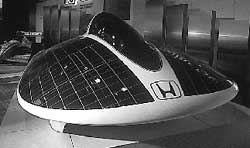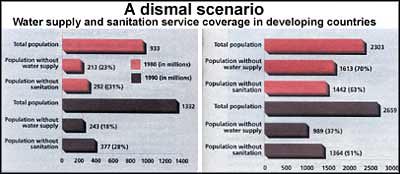
Fuels for the future
Despite being clean, alternative fuels fail to become the first choice

Despite being clean, alternative fuels fail to become the first choice
Sinha will make life even more miserable for Indians. Wealth will come about but at the cost of the environment
We hope that this voice of academics, professionals and scientists will become a shout and then a scream very soon
At the end of day, the biggest <br>problem is the lack of public pressure.<br>Indian people think very little about<br> their health till they fall ill <br>
If we have good knowledge and we have social capital friends and experts willing to cooperate with us we can work Indian democracy
Public awareness, clear thinking and practical demands will help us monitor the government and fight for the changes that are needed
The country needs our anger today
Under the Millennium Development Goals MDG of the United Nations UN , it has been agreed to halve the number of people without access to safe drinking water by 2015. The Johannesburg Plan of
This last fortnight, after two disparate experiences, I came to realise there is not much difference between colas and cars. Let me explain how. A year ago, we released a study on the cocktail
Last fortnight I wrote about making space for emissions. Let s discuss how this can be done. Let s discuss this with governments meeting, possibly for the millionth time, to discuss the global
<img src="image/20070115/5.jpg" align="right"> THE year 2006 will go down as environment's watershed year. This is not because this year we have had extraordinary success in environmental management; there was also no environmental disaster <i>per se</i>. This year must be remembered because the task of environmental management has come to be even more contested and even more challenged. Protests against environmental degradation have grown. But so have efforts to deny environmental concerns or to dilute regulations.
A journalist recently called me to check if I thought that India had the same food consumer product record as China. He wanted to know if we face the problems that are plaguing Chinese exports of
Last fortnight, when the world's richest Indian Lakshmi Mittal visited Kolkata, the city of his youth, he was thrilled to see change. Mittal told the media that the biggest difference he saw was the many flyovers dotting the city skyline and "disciplined traffic".
<p>The Prime Minister has released India’s national action plan on climate change. For those engaged in the business of environment and climate, the plan may offer nothing new or radical. But, as I see it, the plan asserts India can grow differently, because “it is in an early stage of development”.
<p>As I watched President Barack Obama speak on the BP oil spill in the Gulf of Mexico many thoughts crossed my mind. <br />
<p>Very different global rules are needed for human wellbeing</p> <p>Averting climate change does not need emission reduction pledges, timetables and a common legal framework.</p> <p>Climate governance
<div class="authors" style="margin-top: 5px; font-size: 11px; line-height: 22px; margin-bottom: 15px; color: rgb(0, 0, 0); font-family: Arial, Helvetica, sans-serif;"> <span class="tagLabel" style="font-weight:
<p align="center"><img alt="" src="http://www.indiaenvironmentportal.org.in/media/iep/homepage/msanwal_blog.jpg" style="width: 605px; height: 118px; float: left;" /></p> <p>There are two opposing visions

Water. A resource whose scarcity and inefficient allocation gives enough cause for concern. A concern which could find a solution in the concept of market-based allocation and tradeable water rights
<div><span>Shri Jairam Ramesh, the Minister of State for Environment & Forests should indeed be complimented for reviewing the clearances given for Vedanta (Bauxite Mining), POSCO (Steel Plant) and a few other projects. I welcome these decisions. They have certainly set a new trend in environment governance in the country. </span></div> <div> </div>